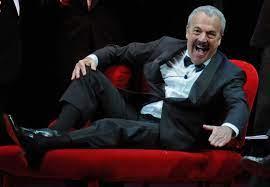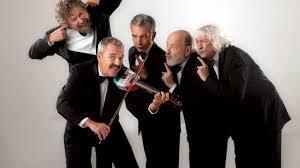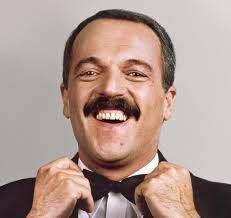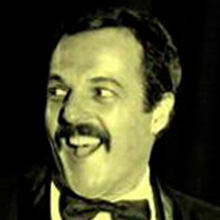Me río con los chistes que apelan a la gracia inteligente, más blanca.
Daniel Rabinovich es miembro fundador del grupo escénico musical más importante de humor de habla hispana y quizás hasta del mundo: Les Luthier. Y es actor y escritor también, además de Notario. Solo con ese curriculum está más que justificado invitarlo a que esté aquí conmigo entablando este “diáloco”. Pero en lo personal hay más. Es mi amigo y no porque sea amiguito de Facebook, o porque nos hemos visto o escrito un par de veces. Es mi amigo de verdad, de esos pocos que uno logra tener en la vida.
Lo conocí en La Habana cuando Les Luthiers, después de su actuación en el teatro, fue invitado por el humorista Virulo, Director del Conjunto Nacional de Espectáculos en ese momento, para homenajearlos en la Sala Atril del Teatro Karl Marx. Presentes como cien personas (muchas personalidades), los miembros del grupo argentino accedieron a actuar varios números de su repertorio. Extraordinario ver a los Maestros ahí, a dos metros. Cuando terminaron, Virulo se nos acercó (yo dirigía el grupo La Seña del Humor de Matanzas) y nos dijo a Aramís Quintero y a mí (ambos éramos los guionistas y dierectores artísticos del grupo), que presentáramos algo. Hay que imaginarse a esos novatos tener que actuar frente a aquellos monstruos del arte humorístico. Lo hicimos. Solo recuerdo que me temblaban las piernas en el escenario. Cuando bajamos, nos esperaban Daniel, Marcos Mundstock y Enrnesto Acher para felicitarnos y abrazarnos. Por supuesto, esa noche pensamos que lo hicieron por conmiseración y humanidad. Años después nos enteramos por boca de ellos que no fue compasión, sino por la agradable sorpresa que sintieron al ver un grupo de jóvenes amateurs, allá en una Isla en el Caribe y más encima de provincia, que hacía el mismo tipo de humor que ellos. Me refiero al humor, no al profesionalismo, que estábamos bien lejos de ellos, obvio.
Pues pasaron pocos años y cuando comencé a residir en Chile, fui a verlos al teatro en Santiago, compartí sobre todo con Daniel y a partir de ahí surgió una sincera amistad, como ya dije.
Siempre he estado maravillado de poder ser amigo de verdad de uno de mis ídolos. Un privilegio absoluto.
Pues aquí tenemos a Daniel Rabinovich, para hacer un breve intercambio en este “diáloco”.
PP: Amigo mío, ¿te gustan que te hagan entrevistas?
DANIEL: No mucho, pero lo prefiero a hacerlas yo mismo.
PP: Entonces estoy tranquilo que nunca me harás una. Mira, para que los lectores futuros lo sepan, estamos en el año 2011. Dicho eso, ¿cómo ves el estado del humor en tu Argentina, tanto en televisión, radio, teatro, literatura y gráfica?
DANIEL: En televisión y radio bastante mal: burdo, zafio, de mal gusto; en teatro un poco mejor y en literatura y gráfica mucho mejor, diría que bien.
PP: Te he dicho varias veces que para mí, Argentina es la capital del humor de Latinoamérica. Y que me digas que en literatura y gráfica está bien la cosa, lo confirma, porque lo que he visto en los países que he visitado, el humor en la televisión y la radio también están mal, en tetaro regular, igual a tu opinión, pero en literatura están mal. Solo se salva un poco la gráfica. Y quedándonos en el Continente, he comprobado que en varios países se dice: "Mi país es un pueblo de humoristas", "en mi país, tú mueves una piedra y sale un humorista”, etc. ¿En Argentina se dice lo mismo?
DANIEL: No, y tienen razón. Si mueves una piedra sale un corrupto.
PP: ¡En toda América Latina sucede lo mismo!, así que mejor nos salimos de ahí. Por ejemplo, me gustaría preguntarte si es verdad la acuñada frase: "Es más fácil hacer llorar que hacer reír?
DANIEL: Creo que sí... Lo que se acuña, ¿no son monedas?
PP: Pensé que me ibas a hacer un chistecito con tu cuñada… y me alegro que coincidmos. Y pienso así, no solo porque lo primero que uno hace al nacer es llorar y no solo porque abundan tanto las desgracias, las tragedias en la vida. Hacer reír va de lo muy fácil: un chite físico naif, elemental, hasta el muy elaborado, de eso llamado humor inteligente, que no es otra cosa que hacer que el público se sienta inteligente. Por eso hay menos creadores de humor que creadores drmas y tragedias. Y a propósito, ¿cuándo decidiste hacerte humorista?
DANIEL: Cuando me di cuenta de que era más fácil hacer llorar al público.
PP: ¿Ves? Y dime una cosa: ¿el humorista nace o se hace?
DANIEL: Nace humorista y se hace el payaso.
PP: Si lo dices porque hacerse el payaso es algo malo, no estoy de acuerdo. Aunque espero que no, porque siempre has dicho que lo eres y yo apruebo, porque también me siento un payaso. Y me siento muy orgullosos de serlo. Ya sea ñporque nací así o me hice después. Ahora una pregunta más íntima: ¿cuál ha sido el mejor y el peor momento de su carrera en el humor hasta el día de hoy?
DANIEL: El peor, el día en que me olvidé de ponerme el smoking y entré desnudo al escenario y el mejor, esa misma noche, con dos de las señoras de primera fila.
PP: ¡Qué nochecita nos espera!, como diría Marcos en diálogo en escena contigo… Ahora te pregunto: como profesional del humor, ¿te ríes fácil? ¿Con qué tipo de chistes?
DANIEL: Sí. Con los buenos, los que apelan a la gracia inteligente, más blanca.
PP: ¡Bien! Menos mal… Estamos de acuerdo. Por favor, ¿tienes alguna anécdota relacionada con nuestra profesión?
DANIEL: Montones. No pienso contarlas jamás. Soy casado.
PP: Y dale con el tema de connotación sexual o romántica. Mejor te pregunto algo más directo, ¿con cuáles colegas te identificas?
DANIEL: Charlie Chaplin, The Marx Brothers, Woody Allen, Laurel y Hardy, Buster Keaton, Mel Brooks, El Tricicle, Landriscina, Quino, Fontanarrosa, Peter Sellers, Dany Kaye, Les Luthiers.
PP: ¡Qué raro que te identifiques con Les Luthiers! Aunque no tanto, en mi caso añadiría a La Seña del Humor. Y para ir cerrando este diáloco, ¿qué me aconsejaría a mí como humorista?
DANIEL: Evitar el machismo, la misoginia, el mal gusto, la xenofobia. Y apelar siempre, SIEMPRE, a la inteligencia y el buen gusto del espectador.
PP: Gracias, Maestro. No te preocupes, que desde que conozco tu trabajo es lo que trato de hacer.
Gracias también por tu tiempo, esfuerzo y neuronas y seguimos. Un abrazo.
DANIEL: Otro para ti, Pepe querido.



I laugh at jokes that appeal to intelligent, whiter grace
Interview with Daniel Ravinovich
By Pepe Pelayo
Daniel Rabinovich is a founding member of the most important musical stage group in Spanish speaking and perhaps even in the world: Les Luthier. And he is an actor and writer too, in addition to being a Notary.
With that resume alone, it is more than justified to invite him to be here with me engaging in this “dialogue.” But personally there is more. He is my friend and not because he is a Facebook friend, or because we have seen or written to each other a couple of times. He is my true friend, one of those few that one manages to have in life.
I met him in Havana when Les Luthiers, after their performance at the theater, was invited by the comedian Virulo, Director of the National Entertainment Ensemble at that time, to honor them in the Lectern Room of the Karl Marx Theater. Present around one hundred people (many personalities), the members of the Argentine group agreed to perform several numbers from their repertoire. Extraordinary to see the Masters there, two meters away. When they finished, Virulo approached us (I directed the group La Seña del Humor from Matanzas) and told Aramís Quintero and me (we were both the scriptwriters and artistic directors of the group) to present something. You have to imagine those novices having to act in front of those monsters of humorous art. We did it. I just remember that my legs were shaking on stage. When we got down, Daniel, Marcos Mundstock and Enrnesto Acher were waiting for us to congratulate us and hug us. Of course, that night we thought they did it out of compassion and humanity. Years later we found out from their mouths that it was not compassion, but rather the pleasant surprise they felt when they saw a group of young amateurs, there on an island in the Caribbean and above the province, who did the same type of humor as them. . I'm referring to humor, not professionalism, which we were far from them, obviously.
Well, a few years passed and when I began to live in Chile, I went to see them at the theater in Santiago, I shared everything with Daniel and from there a sincere friendship arose, as I already said.
I have always been amazed to be able to be true friends with one of my idols. An absolute privilege.
Well, here we have Daniel Rabinovich, to make a brief exchange in this “dialogue.”
PP: My friend, do you like being interviewed?
DANIEL: Not much, but I prefer it to making them myself.
PP: So I'm sure you'll never make me one. Look, so that future readers know, we are in the year 2011. That said, how do you see the state of humor in your Argentina, both in television, radio, theater, literature and graphics?
DANIEL: On television and radio quite badly: crude, clumsy, in bad taste; in theater a little better and in literature and graphics much better, I would say good.
PP: I have told you several times that for me, Argentina is the humor capital of Latin America. And for you to tell me that in literature and graphics things are good, confirms it, because what I have seen in the countries I have visited, the humor on television and radio is also bad, in regular news, the same as your opinion, but in literature they are wrong. Only the graphics are saved a little. And staying on the Continent, I have verified that in several countries it is said: "My country is a town of comedians", "in my country, you move a stone and a comedian comes out", etc. In Argentina is the same thing said?
DANIEL: No, and they are right. If you move a stone, a corrupt person comes out.
PP: The same thing happens throughout Latin America! So we better get out of there. For example, I would like to ask you if the coined phrase is true: "Is it easier to make people cry than to make them laugh?"
DANIEL: I think so... What is minted, aren't they coins?
PP: I thought you were going to make a joke about your sister-in-law... and I'm glad we agree. And I think this way, not only because the first thing one does when born is cry and not only because misfortunes and tragedies abound so much in life. Making people laugh ranges from the very easy: a naive, elementary physical joke, to the very elaborate, what is called intelligent humor, which is nothing other than making the audience feel intelligent. That is why there are fewer creators of humor than creators of dramas and tragedies. And by the way,
When did you decide to become a comedian?
DANIEL: When I realized that it was easier to make the audience cry.
PP: See? And tell me something: is a comedian born or made?
DANIEL: He is born a comedian and becomes a clown.
PP: If you say that because clowning is something bad, I don't agree. Although I hope not, because you've always said you are and I approve, because I also feel like a clown. And I feel very proud to be so. Whether it's because I was born that way or I got it later. Now a more intimate question: what has been the best and worst moment of your career in humor to date?
DANIEL: The worst, the day I forgot to put on my tuxedo and entered the stage naked and the best, that same night, with two of the ladies in the front row.
PP: What a night awaits us! As Marcos would say in dialogue on stage with you... Now I ask you: as a humor professional, do you laugh easily? With what kind of jokes?
DANIEL: Yes. With the good ones, those who appeal to intelligent, whiter grace.
PP: Good! Thank goodness… We agree. Please, do you have any anecdotes related to our profession?
DANIEL: Lots. I don't ever plan to tell them. I am married.
PP: And hit on the issue of sexual or romantic connotations. Better to ask you something more direct, which colleagues do you identify with?
DANIEL: Charlie Chaplin, The Marx Brothers, Woody Allen, Laurel and Hardy, Buster Keaton, Mel Brooks, El Tricicle, Landriscina, Quino, Fontanarrosa, Peter Sellers, Dany Kaye, Les Luthiers.
PP: How strange that you identify with Les Luthiers! Although not so much, in my case I would add The Sign of Humor. And to close this dialogue, what would you advise me as a comedian?
DANIEL: Avoid machismo, misogyny, bad taste, xenophobia. And always, ALWAYS, appeal to the intelligence and good taste of the viewer.
PP: Thank you, Master. Don't worry, since I know your work that's what I try to do.
Thank you also for your time, effort and neurons and we continue. A hug.
DANIEL: Another one for you, Pepe dear.
(This text has been translated into English by Google Translate)

